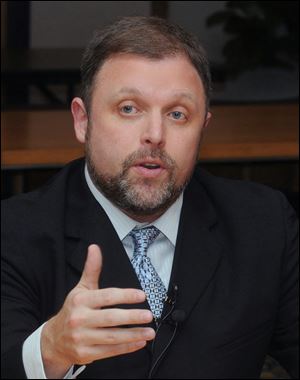
CHANGING MINDS, CHANGING LIVES
Initial forum on race seen as the way to open hearts
Positive change can come, guest speaker, others say
9/11/2013
Anti-racist essayist, author, and educator Tim Wise, who will speak at a Sept. 12 forum at Woodward High School in Toledo.
As a campus activist at Tulane University, Tim Wise opposed apartheid and sought an end to racial segregation in South Africa.
But issues of inequality — deeply rooted and unjust — lurked much closer.
“In New Orleans, I was surrounded by institutional racism and white privilege every day,” he said.
His mentors, many of whom were people of color, were glad for Mr. Wise and his fellow activists’ efforts, but they pointed out racism remained a problem at home too. “I got drawn into thinking about race as it related to my own position in the world…, what it meant to be white in New Orleans,” he said. “Once you start thinking about that,… I had a very hard time turning away from it.”
RELATED CONTENT: Changing Minds, Changing Lives forums
He did not avert his eyes. Instead, he wrote a memoir, White Like Me: Reflections on Race from a Privileged Son, among other books. He also appears frequently on television programs and speaks throughout the country about white privilege and institutional racism.
The message is coming to Toledo.
Mr. Wise is the featured speaker at a 7 p.m. community forum Thursday at Woodward High School. The event, sponsored by the Toledo Community Coalition and The Blade, is the first in a series of forums and other activities aimed at combating racism locally.
Organizers expect hundreds to attend the event, which is free and open to the public. It is the start of a multipronged effort aimed at igniting a citywide conversation about racism, changing minds, and — ultimately — lives.
“I see it as not an end in and of itself, but really the launching, the beginning of a conversation, about race that’s going to produce concrete results,” said the Rev. Robert A. Culp, pastor of First Church of God and coalition co-chairman. “When you change minds and change lives, you … set in motion possibilities that change the whole culture of relationships and quality of life.”
Organizers have cited two timely, race-related factors as reasons why The Blade and the coalition teamed up to organize the forums and associated programs: The newspaper’s series “Battle Lines: Gangs of Toledo,” published in April, and the clearing of George Zimmerman in the shooting death of Trayvon Martin, an unarmed black teen.
Later forums will tackle racism through the lens of education, criminal justice, and generational poverty. Residents also will be encouraged to perform acts of kindness for someone of a different ethnicity; churches will pair up and members will participate in discussions and community service projects together; another effort will reach out to young people to talk about race.
Pastor Culp wants the initiative to change the environment so people don’t look at each other with suspicion. If enough people are enlightened, he said, “that light will prevail.”
Organizers think a key component of the project is the formation of inter-racial study groups that consist of participants from differing backgrounds who meet weekly for six to eight weeks to discuss racial issues and come up with solutions to problems.
Those who attend Thursday’s forum can sign up for the groups, called “dialogue to change groups.” The first groups will be made up of representatives from various government and community agencies, and groups for the general public are expected to start by mid-to-late November, said the Rev. Karen Shepler, a coalition member who retired from Monroe Street United Methodist Church. She hopes at least 50 local groups, with eight to 10 members each, meet within the upcoming months.
“There have been a lot of opportunities to talk about racism in the past, but we can talk forever. If there isn’t any change in attitude or action, it doesn’t mean anything,” she said.
She hopes — through groups, forums, and other efforts — that Toledo will be known as a place that has dealt and is dealing with racism, a city where individuals want to live and businesses want to locate.
Including community leaders as panelists at the forum is among the ways organizers have reached out to local institutions. Karen Mathison, president and chief executive officer of the United Way of Greater Toledo, is participating on the panel because the agency she represents wants to be “intentional” about eliminating stereotypes and racism.
“The reality is that we are one race and that’s a human race,” she said.
Other panelists include Baldemar Velasquez, president of the Toledo-based Farm Labor Organizing Committee; Lisa McDuffie, YWCA president and chief executive officer; the Rev. Larry Clark, pastor of Sylvania First United Methodist Church; Andrea Price, president and chief executive officer at Mercy; and Lorna Gonsalves, an educator and organizer who offers workshops on coming to terms with racism.
Mr. Wise said successful community conversations about race require examining policies and practices used by businesses that thwart the hiring or promotion of minorities. It means looking at how law enforcement uses profiling or how teachers relate to students.
The challenge, he said, is what people do when they return to their workplaces, neighborhoods, or schools to create real movement.
It’s a lesson he continued to learn after college, when Mr. Wise worked with the Louisiana Coalition Against Racism and Nazism to defeat former Ku Klux Klan leader David Duke in his campaigns for U.S. Senate and Louisiana governor.
“I just came to see what the dangers were [in] not addressing institutional racism, of not addressing white privilege, of not addressing the racial divide,” Mr. Wise said.
Contact Vanessa McCray at:
vmccray@theblade.com,
419-724-6065, or on
Twitter @vanmccray.